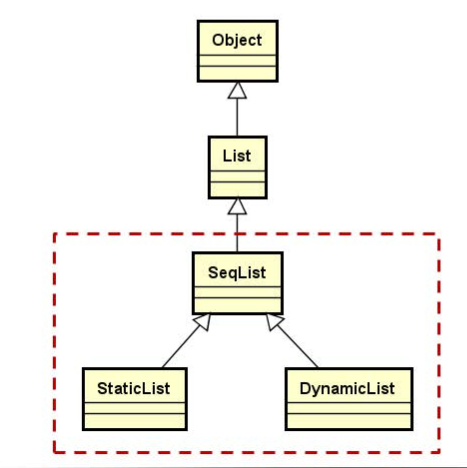线性表的表现形式:数据元素个数有限,数据元素类型相同,数据元素是有序排列,数据元素个数为零或多个
线性表的定义:线性表是具有相同类型的数据元素的有限序列。
线性表的性质:一个表项对应于一个数据元素。线性表第一个元素只有一个后继,线性表最后一个元素只有一个前继,中间元素只有一个后记和一个前继。只能逐项访问线性表,顺序存储线性表。
线性表的操作:插入元素,删除元素,获取元素值,设置元素值,获取线性表长度,将线性表的所有元素清零
线性表在C++中表现为 :线性表抽象类
List 抽象类。抽象类接口:不定义对象。定义纯虚函数(插入,删除,设置,获得,长度,清零)
Seqlist 抽象类。 抽象类模板:不定义对象。实现操作(增加,删除,查询,设置,长度,清零)添加(重载赋值操作符,存储空间最大容量)。不定义存储空间的位置和元素的大小。
StaticList 类。类模板:定义连续存储空间的位置(栈空间的原生数组),存储空间的大小(模板类型参数和数组长度)。
DynamicList 类。类模板:定义连续存储空间的位置(堆空间),存储空间的大小(动态设置)。异常安全,被异常抛出时对象成员保证有效状态,没有数据被破坏。
上列类关系图:

List.h

/* * List类:线性表接口。 * 继承TopClass类,被SeqList继承。 * 实现纯虚函数:插入,删除,设置值,获得值,获得长度,清除线性表。 * */ #ifndef LIST_H #define LIST_H #include"TopClass.h" namespace DSL { template <typename T> class List: public TopClass { public: virtual bool insert(int pos, const T& obj) = 0; virtual bool remove(int pos) = 0; virtual bool set(int pos, const T& obj) = 0; virtual bool get(int pos, T& obj) const = 0; virtual int length() const = 0; virtual void clean() = 0; }; } #endif
SeqList.h

/* * SeqList:线性表抽象类。 * 成员变量:m_array 存储空间指针 * m_length 存储空间中的线性表长度 * 成员函数:insert() * remove() * set() * get() * length() 获得线性表长度 * clear() 清除线性表 * operator[] 重载数组成员访问符 * capacity() 存储空间大小 * */ #ifndef SEQLIST_H #define SEQLIST_H #include"List.h" #include"Exception.h" namespace DSL { template <typename T> class SeqList : public List<T> { protected: int m_length; T *m_array; public: bool insert(int pos, const T & obj) { bool ret = ((pos >= 0) && (pos <= m_length)); ret = ret && (m_length < capacity()); if(ret) { for(int post = m_length - 1; pos <= post; post--) { m_array[post + 1] = m_array[post]; } m_array[pos] = obj; m_length++; } return ret; } bool remove(int pos) { bool ret = ((0 <= pos) && (pos <= m_length-1)); if(ret) { for(int post = pos; post < m_length - 1; post++) { m_array[post] = m_array[post + 1]; } m_length--; } return ret; } bool get(int pos, T& obj) const { bool ret = ((pos >= 0) && (pos <= m_length -1)); if(ret) { obj = m_array[pos]; } return ret; } bool set(int pos,const T& obj) { bool ret = ((pos >= 0) && (pos <= m_length -1)); if(ret) { m_array[pos] = obj; } return ret; } int length() const { return m_length; } void clean() { m_length = 0; } T& operator[] (int pos) { if( pos >= 0 && pos <= m_length -1) { return m_array[pos]; } else { THROW_EXCEPTION(IdexOutOfBoundException,"error: index out of bound!"); } } T operator[] (int pos) const { return (const_cast<SeqList<T>&>(*this))[pos]; } virtual int capacity() const = 0; }; } #endif
StaticList.h

/* * StaticList:静态顺序存储链表 * 成员变量:m_space[] 静态数组 * * 成员函数:StaticList() 初始化m_array指针指向线性表 * capacity() 存储空间大小 * * */ #ifndef STATICLIST_H #define STATICLIST_H #include"SeqList.h" namespace DSL { template <typename T, int N> class StaticList : public SeqList<T> { protected: T m_space[N]; public: StaticList() { this->m_array = m_space; this->m_length = 0; } int capacity() const { return N; } }; } #endif
DynamicList.h

/* * DynamicList:动态顺序存储链表 * 成员变量:m_capacity 顺序存储空间大小 * * 成员函数:DynamicList 申请堆空间 * capacity 返回堆空间大小m_capacity * resize 重新设置存储空间大小 * ~DynamicList 归还空间 */ #ifndef DYNAMICLIST_H #define DYNAMICLIST_H #include"SeqList.h" #include"Exception.h" namespace DSL { template <typename T> class DynamicList : public SeqList<T> { protected: int m_capacity; public: DynamicList(int size) { this->m_array = new T[size]; if(this->m_array != NULL) { this->m_capacity = size; this->m_length = 0; } else { THROW_EXCEPTION(NotEnoughMemoryException,"error: no enough memory!"); } } int capacity() const { return m_capacity; } void resize(int new_size) { if(new_size != m_capacity) { T* array_temp = new T[new_size]; // 如果直接将申请空间地址赋值给this->m_array,将会丢失原来的数据 if(array_temp != NULL) { int length_temp = (new_size > this->m_length ? this->m_length : new_size ); for(int i = 0; i < length_temp; i++) { array_temp[i] = this->m_array[i]; // 赋值操作符发重载函数发生异常? } T* temp_m_array = this->m_array; //1.便于释放重定义大小前的空间 //2.如果直接delete this->m_array时,如果析构函数抛出异常将会直接返回,无法初始化成员变量 this->m_capacity = new_size; // 异常安全 this->m_length = length_temp; this->m_array =array_temp; delete[] temp_m_array; } else { THROW_EXCEPTION(NotEnoughMemoryException,"error: no enough memory!"); } } } ~DynamicList() { delete[] this->m_array; } }; } #endif
